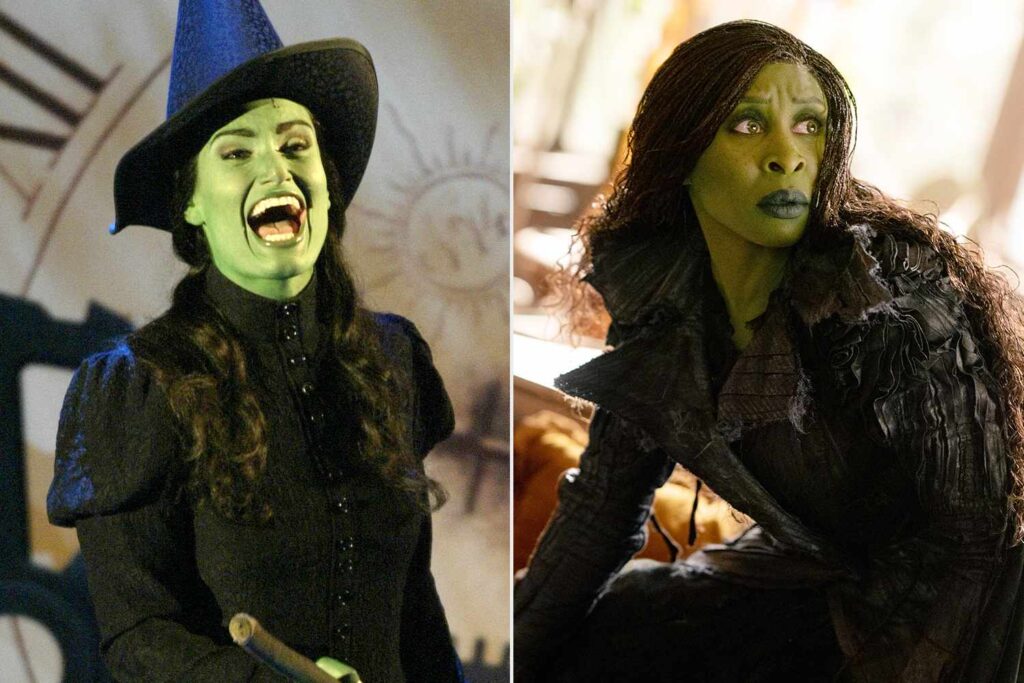NEED TO KNOW
Wicked: For Good defied all expectations.
It’s been almost a decade since it was first announced that the Tony-winning Broadway musical — which is based on the 1995 novel Wicked: The Life and Times of the Wicked Witch of the West by Gregory Maguire — was being adapted into a movie. Starring Cynthia Erivo as Elphaba and Ariana Grande as Glinda, Wicked premiered in theaters in November 2024 and became a box office success.
Following the premiere, Kristin Chenoweth, who portrayed Glinda in the original Broadway production alongside Idina Menzel’s Elphaba, praised the adaptation in an Instagram reel, saying, “People are not going to be well when they see this film. It is so good, it is so special.”
“The story is so wonderful, and Cynthia and Ariana are amazing. The whole cast is amazing,” Chenoweth continued. “[Director] Jon [M.] Chu nailed it. I was so moved, emotional, happy, filled with joy.”
Nearly one year later, Wicked: For Good premiered in theaters on Nov. 21, following a plot line similar to the musical’s second act: the transformation of Elphaba and Glinda into their respective roles as Wicked Witch of the West and Glinda the Good. Now, not only have Wicked fans finally gotten closure to the story, but there were also several new additions made from the musical onto the big screen.
Below, here are seven differences between Wicked: For Good and the Broadway musical.
Warning: Wicked: For Good and Wicked the musical spoilers ahead.
There are two new songs in the movie
Giles Keyte/Universal Pictures
If you’ve been listening to the musical’s soundtrack on repeat to prepare for the film, then you’ll quickly notice one of the film’s biggest changes: two brand-new songs.
Erivo’s “No Place Like Home” and Grande’s “The Girl in the Bubble” were written and composed by Stephen Schwartz specifically for the film.
There is no wedding for Fiyero and Glinda in the musical
Giles Keyte/Universal Pictures
The movie introduces a new climax to the end of Fiyero (Jonathan Bailey) and Glinda’s romance: an almost-wedding.
Glinda walks down the enchanted aisle to wed Fiyero, though the wedding is disrupted when a group of stampeding animals that have recently been let out of their cages by Elphaba enter — and end — the ceremony.
Ahead of the release, Bailey told PEOPLE that the addition of a wedding to the film is an opportunity to show how Fiyero’s relationship with both Glinda and Elphaba has evolved.
“He probably was sent to boarding school at a young age and isn’t quite sure that he knows what real love is,” Bailey said.
Meanwhile, Chu told Vanity Fair in June 2025 that a wedding “seemed appropriate” because it’s “life or death for all of them.”
He also teased how a wedding raised the stakes for the turning point between Glinda’s relationship with Fiyero and friendship with Elphaba: “It’s harder to forgive certain things in certain scenarios. It makes it more complicated,” he said.
Dorothy is seen more in the movie — though her face is never shown
Universal Pictures/YouTube
Dorothy Gale — the recognizable Wizard of Oz figure who dons a blue gingham dress and pigtails — is featured more heavily in Wicked: For Good than she is in the stage show, though her face isn’t visible to the audience.
“I didn’t want to step on who you think Dorothy is in whatever story that you came into this with,” Chu explained to PEOPLE, adding that ultimately, the movie “is still Elphaba and Glinda’s journey, and she is a pawn in the middle of all of it.”
Erivo echoed the reasoning during a September 2025 conversation with Empire Magazine, saying, “I think that’s such a wonderful thing to do, because then everyone gets to keep the Dorothy that they know.”
Nessarose’s jeweled silver slippers have a different meaning in the movie
Universal Studios
In December 2024, Bode, who portrays Elphaba’s disabled sister Nessarose, spoke to PEOPLE about a pivotal change from stage to screen. In the musical, the jeweled silver slippers Nessarose inherited from her late mother are infused with magic that allows whoever wears them to stand and walk. When Nessarose realizes Elphaba and her Grimmerie spellbook can apply to her disability, she begs her sister to cast the spell and sings about “longing to kick up my heels.”
But in the movie, rather than Nessarose “pleading for a disability to be fixed,” the new script is instead “just focusing on the magic in general and the magic of the story,” Bode told PEOPLE.
In Wicked: For Good, her desire to walk comes more from a place of wanting to return to the feeling of “floating on air” she experienced when she danced with Boq at Ozdust — not a wish to be able-bodied. So, Elphaba makes Nessa float on air, though she ultimately returns to her wheelchair.
Bode told PEOPLE that the change was one of the “first conversations” she had with the director. Although she wasn’t there for the actual script change, she recalled Chu telling her that they changed the part so that it felt “less like a fixing moment.”
There are extended sequences with young Glinda that show more of her origin story
Universal Pictures
While Wicked portrayed a young Elphaba, this time around, Wicked: For Good gives viewers more of a glimpse into Glinda’s origin story. Portrayed by Scarlett Spears, Young Glinda has extended sequences in the film.
In Wicked: For Good, Young Glinda reminds viewers of Glinda’s ultimate dream in life: to have magic.
Nearly a month before the film’s release, Grande shared a photo of her and Spears dressed in their Glinda costumes on Instagram, writing, “thank you for your beautiful work and for allowing the world to understand our Galinda more deeply than ever before.. ♡ i adore you so.”
The reason behind Glinda’s bubble is made more clear in the movie
Giles Keyte/Universal Pictures
Although Glinda’s bubble is certainly no new addition to the film, Wicked: For Good shares more about the origins of her mode of transport.
The bubble machine was gifted to her by The Wizard (Jeff Goldblum) in an effort to hide her “magical deficiencies.” Given that Madame Morrible (Michelle Yeoh) has given the town of Oz the illusion that Glinda is the force of good magic protecting them from Elphaba’s wickedness, the bubble — which is operated by foot pedal — allows Glinda to appear magical.
Glinda and Elphaba’s final words to each other differ
Giles Keyte/Universal Pictures
Glinda and Elphaba’s goodbye to each other is heartbreaking in both the musical and the film. However, their final words spoken to each other are changed from stage to screen.
In the musical, Elphaba tells Glinda to hide herself before she is “melted” to death by Dorothy. Meanwhile, in the movie, their friendship comes to more of a tear-jerking — and full-circle — moment, as they exchange heartfelt “I love yous” before Glinda goes to hide.

